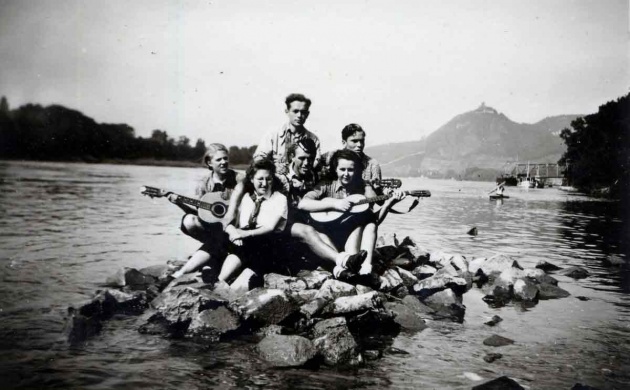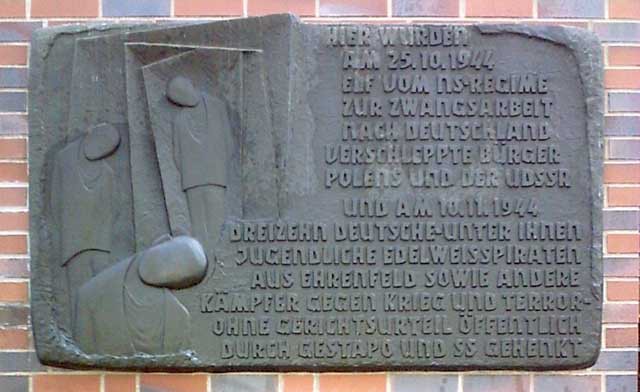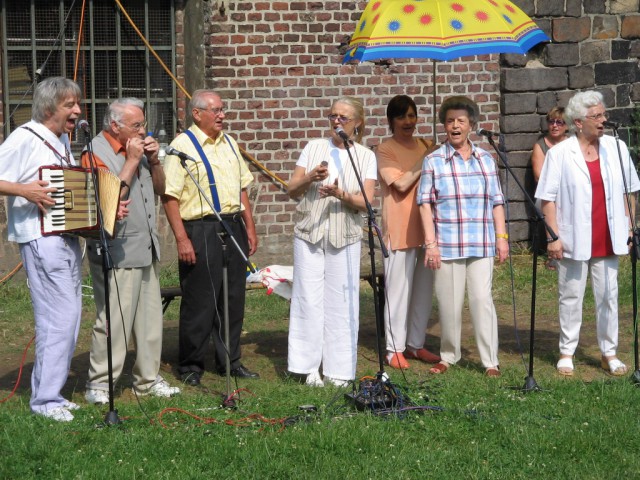
Every generation has its punk rock all-stars and the Edelweiss Pirates, the counter culture to the Hitler Youth, bring that to mind with an added heroic edge. They weren’t all of noble intention, but they did thwart Nazi control knowing the risks, and that’s something.
This sort of confederation of smaller groups that were lumped together under a common name was known for basically being the opposite of the Hitler Youth. Ranging from 12-17 years old, they avoided being conscripted, usually by dropping out of school, and took on a social mission of doing everything they weren’t supposed to be doing as young Aryan men, or in a few cases, young Aryan women.
They drank, they smoked, danced to Jazz and Blues, and went hiking and camping – which was strictly forbidden. Free in the wilderness, they were able to cut up and sing verboten songs and do as they pleased. They listened to the BBC news for outside information when listening to a foreign radio station was illegal. The Pirates had fun with criminal pranks like pouring sugar in petrol tanks, graffiti, and general vandalism.
Some groups took on specific names, like The Navajos, the Kittelbach, and the Farhtenstenze (traveling dudes). While that seems to parallel a gang culture, unlike gangs, they respected and supported each other. Most of them wore a badge picturing the edelweiss flower, and there were shared fashion trends among the groups.
They wore colorful and patterned clothes, some wore lederhosen, they kept their hair longer than the norm and wore white stockings and neck scarves. Once they caught the eye of the Gestapo, many had their heads shaved in punishment, and this became an identifying feature, but not a universal one.
Hitler’s power may lay us low,
And keep us locked in chains,
But we will smash the chains one day,
We’ll be free again
We’ve got fists and we can fight,
We’ve got knives and we’ll get them out
We want freedom, don’t we boys?
We’re the fighting Navajos!
They didn’t just have fun – they committed subversive acts that were a bit more targeted than singing a few songs. Allied planes would drop propaganda, and the Edelweiss Pirates would make sure they weren’t scooped up and thrown away. The Pirates collected them and shoved them in letterboxes and under doors.
They were feared by the Hitler Youth and local Nazi officials because a very few Pirates were known to have ambushed these groups and beat them. Some groups claim to have only wanted to be left alone by the Hitler Youth and that they had nothing against the boys conscripted, but a common phrase was “Eternal War on the Hitler Youth.”
Although many adults saw them as punk kids too lazy to work and up to nothing but mischief, they tried and succeeded at making an impact against the regime. They destroyed and sabotaged Nazi equipment and ammunition. They stole supplies and bicycles from the Hitler Youth. They assisted deserters of the German Army.
They were also often armed, killing one army informer and doing several armed raids on Nazi military depots. The Pirates derailed ammunition trains and supplied adult resistance groups with food, supplies, and ammunition that they had stolen or looted.
Many of their acts were kind – they gave refuge to concentration, labor, and POW camp escapees.
Captured Pirates faced much more than a slap on the wrist, and yet knowing the consequences, they continued their resistance. Parents also came under scrutiny when Pirates were caught, although many were unattached to their families or didn’t have them at all.
At first, punishments were meant to demoralize them. Heinrich Himmler knew that the Pirates took pride in their subversive appearance, particularly their hairstyle, so when they were captured they went for a short while to a detention camp and their heads were shaved when they were released.
We march by banks of Ruhr and Rhine
And smash the Hitler Youth in twain.
Our song is freedom, love and life,
We’re the Pirates of the Edelweiss.
Over time, however, punishments became more and more severe and eventually ended in death. At first it was severe beatings (girls fared no better than guys), then concentration camps or solitary confinement or both, and finally public hangings. Thirteen youths were hanged in Cologne and of those thirteen, six were Pirates.

Following the war, they denounced any political affiliation with the Allies or the communists saying that politics shouldn’t take center stage. In fact, because they did not conform and remained social outcasts, the Allies took a negative view of them.
Perhaps in some cases, it was justified as there were reports of groups identifying themselves as Pirates that were terrorizing displaced Russians and Poles and possibly women on Allied bases. However, that would have only been a very small subset if they were even affiliated at all.
As for their fate, Pirates that fell on the Soviet side of the wall were automatically sentenced to 25 years in prison just for being suspected of association. Even after the fall of the Berlin Wall, surviving Pirates still have criminal records that state that they were guilty of war crimes. They were finally annulled in 2005.
In that year, they were finally officially recognized as resistance fighters. A female Pirate, Gertrud Koch (a.k.a. Mucki – her Pirate code name) said, “After the war there were no judges in Germany so the old Nazi judges were used and they upheld the criminalization of what we did and who we were.”
Jean Juelich, who had escaped the hanging in Cologne, felt the recognition was long overdue. “This should have happened 40 years ago . . . The families of those who were murdered have been denied any kind of justice until now. They were killed as criminals.”
At the time of the annulment, there were five remaining members in Cologne including Koch and Juelich. Most have since died. That day, however, they performed the songs of the Pirates in remembrance and celebration.

- https://en.wikipedia.org/wiki/Edelweiss_Pirates
- http://www.historylearningsite.co.uk/nazi-germany/the-edelweiss-pirates/
- http://www.independent.co.uk/news/obituaries/fritz-theilen-member-of-the-edelweiss-pirates-the-children-who-resisted-hitler-7707378.html
- http://www.raoulwallenberg.net/saviors/others/edelweiss-pirates-story/
- http://www.teenagefilm.com/archives/archive-fever/edelweiss-pirates
- http://www.telegraph.co.uk/news/worldnews/europe/germany/1492771/Teenage-rebels-who-fought-Nazis-are-honoured-at-last.html